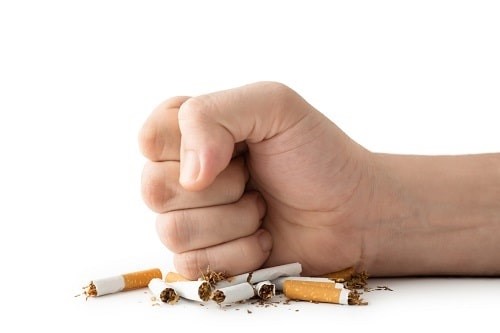National No Smoking Day on 8 March is a great opportunity to help staff to quit smoking or vaping, but it’s essential to adopt the right tone and approach.
Features
Time to quit – top tips for an effective stop smoking programme at work
Trying to cajole, inspire and motivate employees to engage with a stop-smoking initiative can be challenging. As a chain-smoker I remember too well how I would rebuff any suggestion that I stop smoking – let alone if it were delivered in my workplace.
Most smokers tend to have an off switch in their mind when it comes to talk of quitting smoking or the dangers of smoking. Earlier this year I was asked to appear on the Jeremy Vine Show to talk about how smokers might go about quitting.
The television production team originally planned an introduction featuring graphic information about cancer, emphysema and all the other horrific illnesses caused by smoking. I urged them not to do so. If their objective was to engage with smokers, I explained, they should understand the first thing any self-respecting smoker would do at the mere mention of health consequences would be to switch channels immediately. They were brilliant about it and understood – as counter intuitive as it felt to them – that my argument made sense.

Never make the mistake of thinking that ‘one won’t hurt’. It will, and before you know it, you will smoke another, and another and another. Photograph: iStock
National No Smoking Day on Wednesday 8th March is a day that a good number of smokers, at best tolerate and at worst, resent. Of course, there are plenty who will use the day to launch a quit attempt and if they go about it with the right support, their chances of success are excellent.
Avoid lecturing smokers
To draw in all smokers on National No Smoking Day, including those hardened ‘resenters’, a light-hearted, softly-softly, gentle touch tone is essential and will yield far better engagement than health warnings or lectures.
So, how can you maximise a smoker’s chances of successfully quitting? Hosting free quit smoking events in the workplace is a popular approach and these tend to be better attended if they are preceded by a month-long awareness campaign.
When running our stop smoking sessions for corporate clients, Allen Carr’s Easyway finds that using humour, clear non-judgemental messaging and an upbeat tone results in, that rarest of occurrences: over-subscribed quit smoking events at work. If this approach works for Google, Facebook, IBM and Microsoft it will work for any other business.
Implementing an ongoing, year-round quit smoking strategy in the workplace is key and any campaign does not be have to be limited to encouraging workers with the health and financial benefits of quitting tobacco. E-cigarettes are now very prevalent at work, but it is easy to overlook the fact that more and more vapers are desperately seeking help and support to quit.
 John Dicey: "Allen Carr’s Easyway to Stop Smoking Live Seminars are a genuinely drug-free option to break the habit."
John Dicey: "Allen Carr’s Easyway to Stop Smoking Live Seminars are a genuinely drug-free option to break the habit."
Getting hooked on e-cigarettes no longer just applies to former smokers who used them to quit – there is a brand new cohort of ‘never-smoked’ vapers who have been sucked into the nicotine addiction trap by the slick advertising, marketing and point of sale positioning in retail outlets promising sweet and fruity delights from vaping. In some of our quit smoking seminars for corporate clients, 50 per cent of attendees are vapers – many of them ‘never-smokers’.
At Allen Carr’s Easyway, more than 10 years ago we predicted there would be a new generation of nicotine-addicted vapers, and amended our quit smoking programme and sessions so they are equally targeted and effective at helping vapers to quit.
The best advice a smoker or vaper can get to maximise their chances of success is to use an evidence-based treatment. The National Institute for Health & Care Excellence (NICE) recommends certain treatments that have been subjected to their rigorous approval process. They state that the following should be accessible to adults who smoke and wish to quit:
1. Behavioural interventions, behavioural support and very brief advice
2. Medicinally licensed products such as bupropion, nicotine replacement therapy and varenicline
3. Nicotine-containing e-cigarettes
4. Allen Carr’s Easyway to Stop Smoking Live Seminars (a genuinely drug-free option).
Most local authority smoking cessation services (commonly known as local Stop Smoking Services) offer free behavioural interventions – such as advice and support sessions. They can also identify, suggest and issue medically licensed products to help people quit smoking (though prescription charges may apply). Also, e-cigarettes can be purchased from reputable retailers.
Although some local authorities already include Allen Carr’s Easyway seminars among the options available to smokers wishing to quit, they are also available via some corporate health insurance policies, such as Vitality Health, and direct.
With so much help and support available free of charge, there really is nothing stopping employers from super-charging their workplace quit smoking programme for both National No Smoking Day and as part of an ongoing, all-year-round employee health initiative. Even if an employer decides to pay for smoking cessation services at work, the return on investment from a successful quit smoking programme far outweighs the cost.
 Rather than frame your quit as ‘giving up’, think of it in terms of quitting or escaping. Photograph: iStock
Rather than frame your quit as ‘giving up’, think of it in terms of quitting or escaping. Photograph: iStock
For example, after quitting, staff quickly begin to feel fitter and healthier and are therefore likely to perform better at work. That’s not a theory – there’s no end of published studies that irrefutably indicate that work productivity increases dramatically while absenteeism, presenteeism, disciplinary incidents, and workplace accidents are dramatically reduced.
Top tips to help workers successfully quit
If you are producing promotional messages and collateral for National No Smoking Day, here are some tips that you can pass on to help maximise a smoker’s chances of success:
- Conduct an audit of the ways that you have attempted to stop in the past. There is a rather unkind quote decrying doing the same thing over-and-over again and expecting a different result, but in this instance it is a reasonable conclusion. Try something you have never tried before – something fresh, something that offers a promise of freedom.
- Decide whether you want to use nicotine in the form of patches, gum, lozenges or e-cigarettes. If you do, go for it, if not – look for a drug-free option.
- Rather than frame your quit as ‘giving up’, think of it in terms of quitting or escaping. Once you are free of smoking (or vaping if that is what you want to quit), it is a great feeling and really does feel like you have escaped. ‘Giving up’ implies a form of sacrifice and causes people to establish a sense of doom and gloom right from the get-go.
- Do not link your attempt to quit to anyone else. Having a ‘quit buddy’ may seem like a good idea but will derail your own chances of success if they crash and burn. Be selfish – this is a ‘you thing’.
- Set your quit date and stick to it. There is a natural tendency to keep deferring the big day – we assume it is going to be difficult and unpleasant – but do not put off the day; just do it. If you choose a method you are happy with, there is nothing to fear and everything to gain.
- If you are offered a cigarette after you quit, just say: ‘No thanks – I don’t smoke’, rather than start a long, boring conversation about how long it has been since you stopped.
- Once you are free from smoking or vaping never, ever make the mistake of thinking that ‘one won’t hurt’. It will, and before you know it, you will smoke another, and another and another.
- When you quit, get rid of your cigarettes or vapes – do not keep them to hand, ‘just in case’. Psychologically that would mean you have not committed to quitting and is likely to cause you to fail.
John Dicey is Global CEO & co-author of Allen Carr books Allen Carr’s Easyway
For help and advice on quitting smoking or vaping see Allen Carr’s Wellbeing at Work: www.allencarr.com/corporate
Also NHS Better Health: nhs.uk/better-health/quit-smoking
FEATURES

Facing the facts: protecting your outdoor workforce from UV exposure and skin cancer
By SC Johnson Professional on 11 July 2025
With outdoor workers at significant risk of skin damage, ageing and cancer due to exposure to the sun’s UV rays, it’s essential that employers in sectors like construction and agriculture create a working environment where sun safety precautions become the norm, rather than the exception.

2025 UK fire safety regulation updates: a quick guide
By Chloe Miller on 11 July 2025
The regulatory landscape covering fire safety arrangements and structural features in domestic and commercial buildings has undergone a number of significant changes in recent years, making it essential for responsible persons to review their approach to keeping residents, workers and the nearby public safe from the risk of fire.

Tackling new fire risks as Fire Door Safety Week celebrates 12th year
By Helen Hewitt, British Woodworking Federation on 11 July 2025
The British Woodworking Federation’s annual Fire Door Safety Week this September will encourage duty holders such as those in charge of residential buildings to consider the dangers from lithium-ion batteries and ensure fire doors remain fit for purpose in reducing the risk should a battery-related fire break out.



